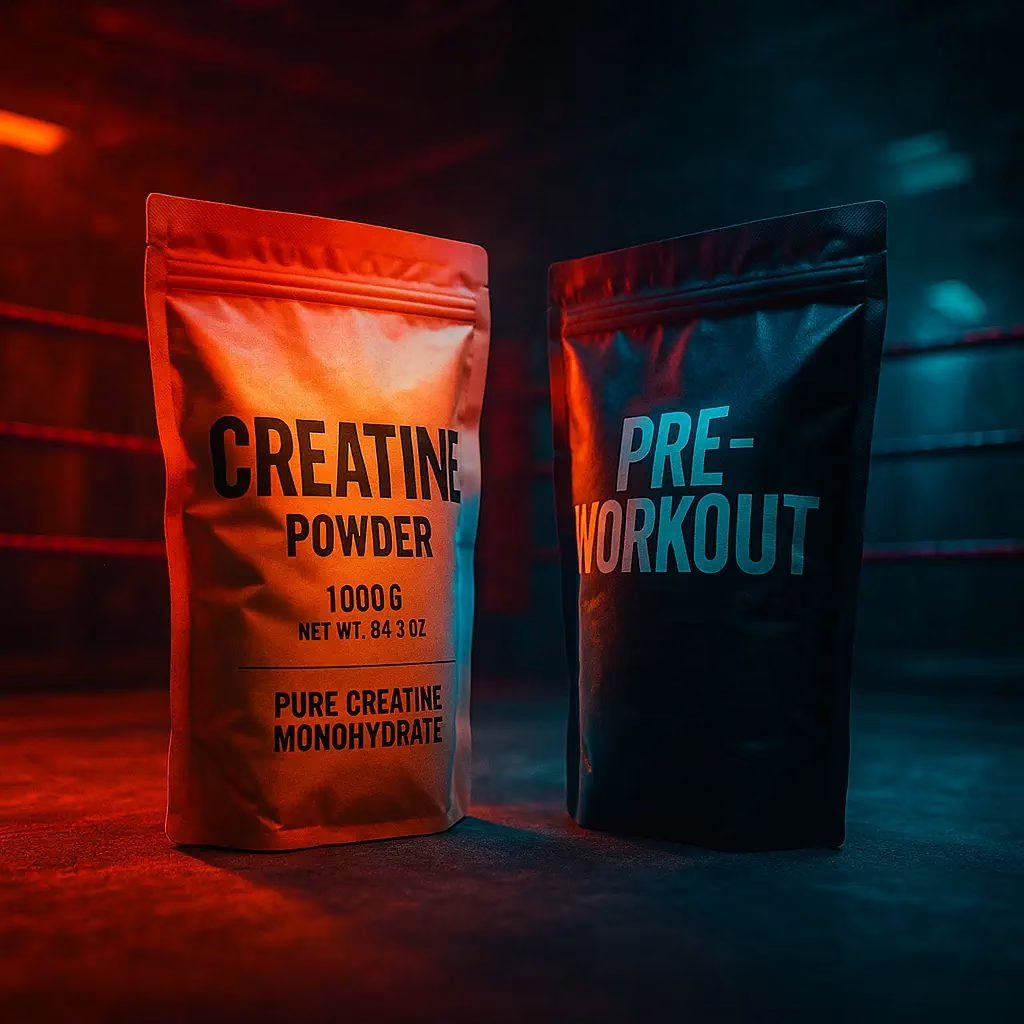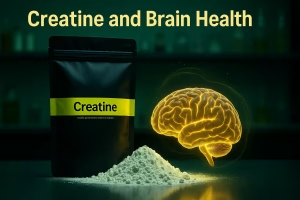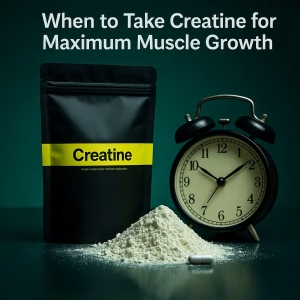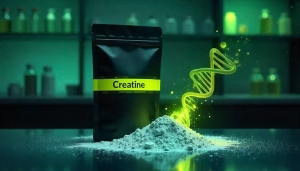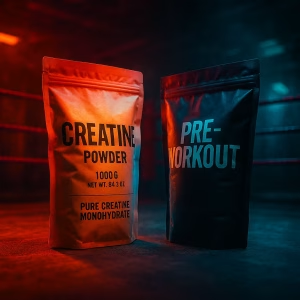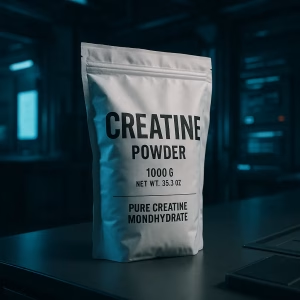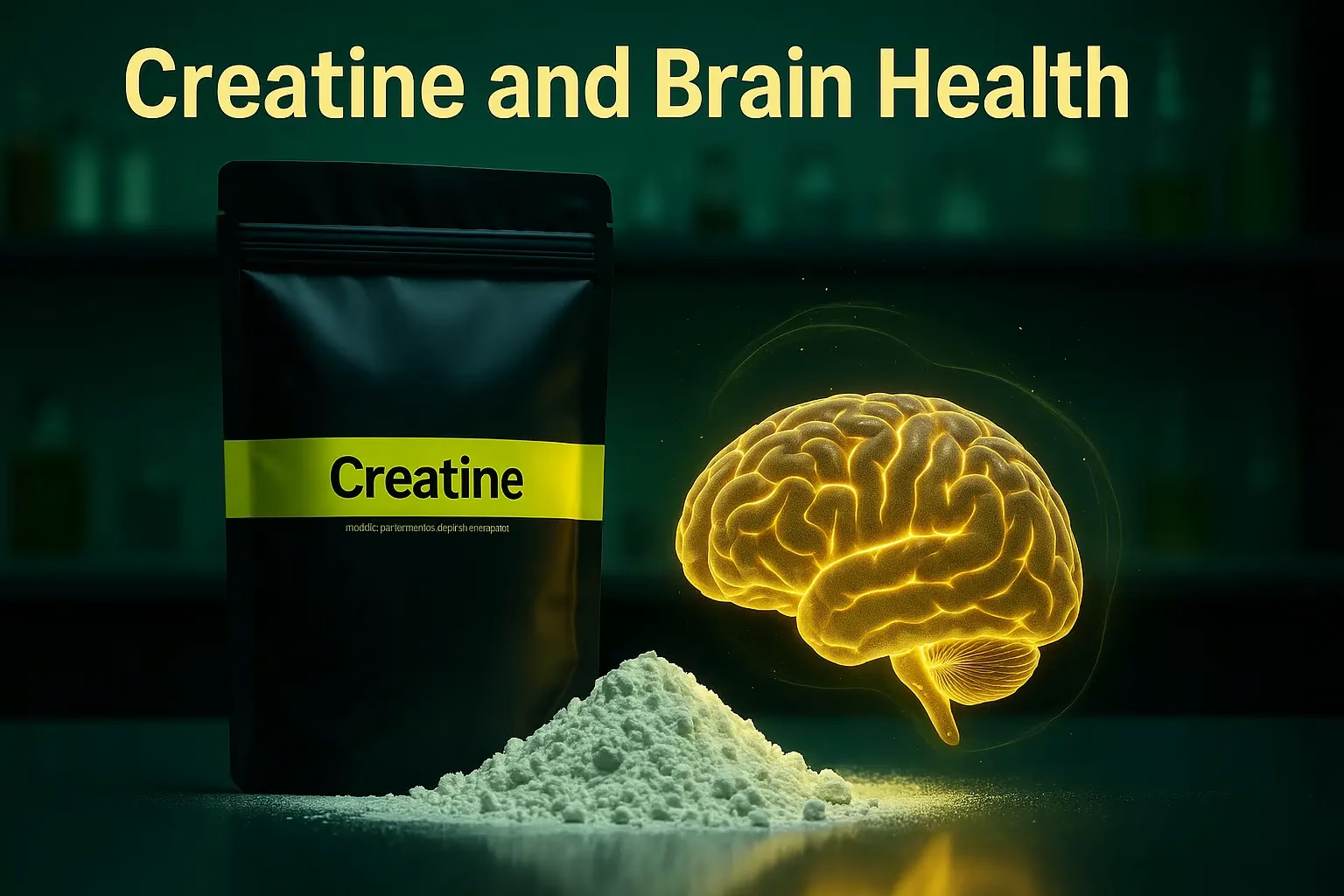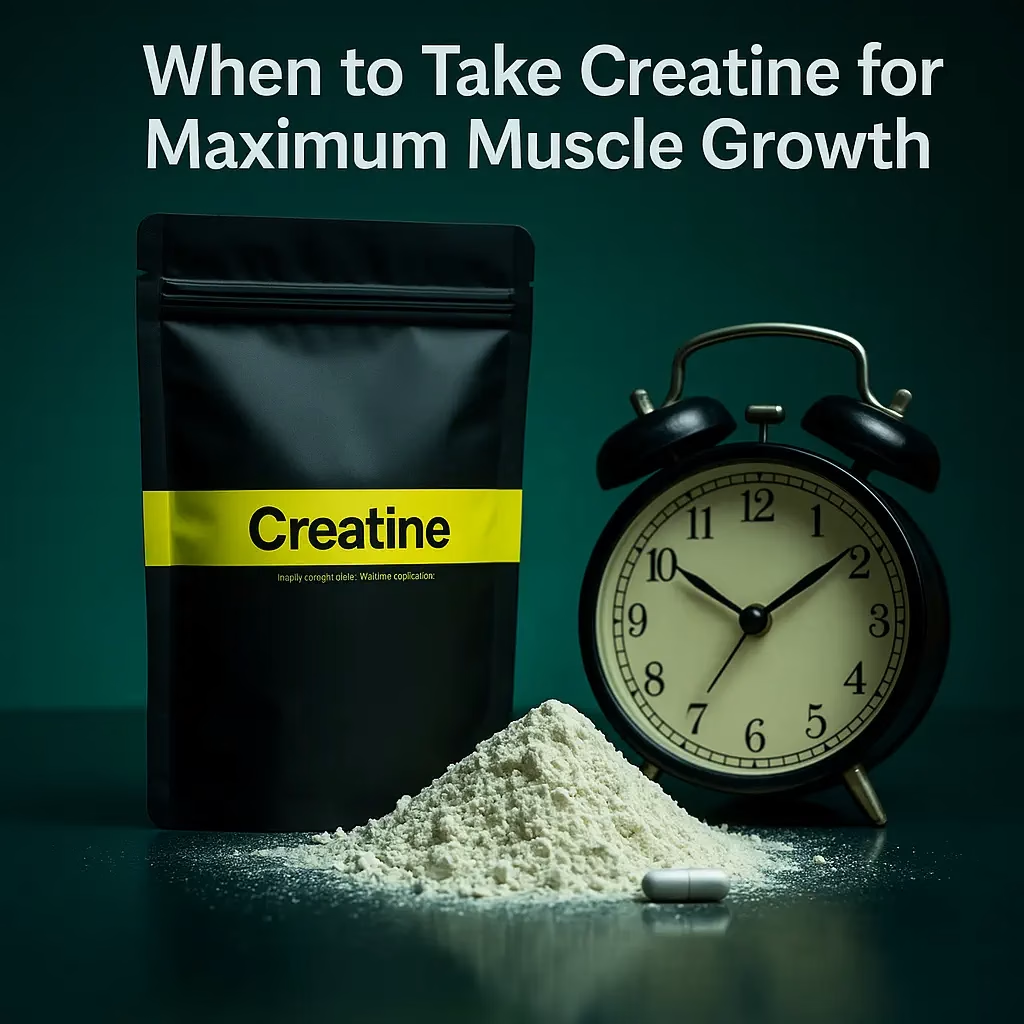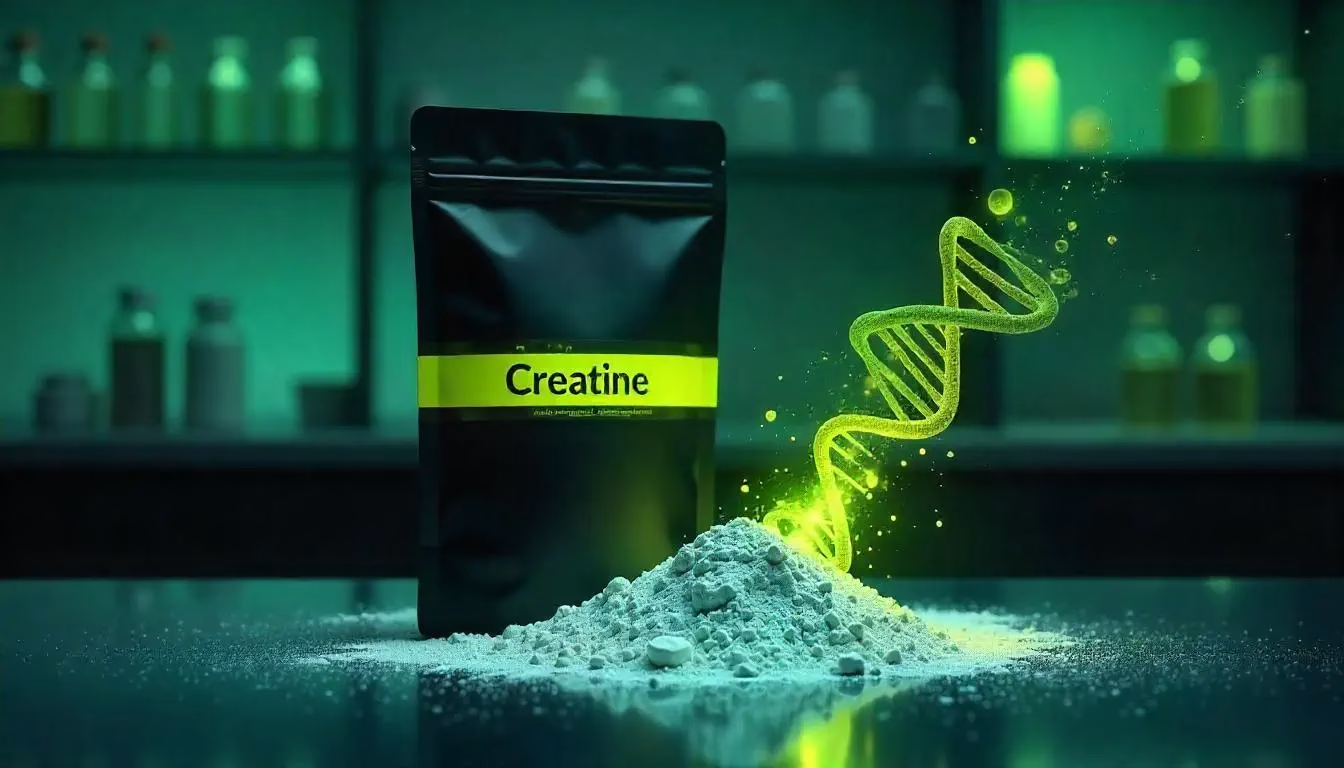One fundamental question continues to divide the fitness community and challenge both newcomers and experienced athletes alike: Should I invest in creatine supplementation or pre-workout formulas for optimal training results? Creatine vs. Pre-Workout: Which Delivers Better Results? This comparison represents one of the most important supplementation decisions for athletes, bodybuilders, and high-performers seeking to maximize their training investments.
The supplement industry generates billions in revenue annually, with creatine monohydrate and pre-workout formulas representing two of the most popular categories. However, these supplements operate through fundamentally different mechanisms, target distinct physiological pathways, and produce varying results depending on individual goals, training protocols, and metabolic factors.
This comprehensive analysis addresses the specific needs of competitive athletes seeking evidence-based supplementation strategies, dedicated bodybuilders optimizing their training outcomes, business executives maximizing limited workout time, and biohackers exploring the intersection of supplementation science and human performance optimization.
What You Are About to Learn
- The fundamental mechanistic differences between creatine and pre-workout supplements and how they impact training performance
- Evidence-based effectiveness comparisons across strength, power, endurance, and cognitive performance metrics
- Cost-benefit analysis revealing which supplement delivers superior long-term value for different training goals
- Strategic combination protocols that maximize the benefits of both supplement categories
- Individual optimization strategies for determining which approach best matches your physiology and objectives
- Professional implementation guidelines used by elite athletes and performance specialists worldwide
Understanding the Core Differences: Mechanism and Function in 2025
Creatine: The Cellular Energy Enhancer
Creatine monohydrate functions as a substrate for the phosphocreatine system—your body’s immediate energy pathway that powers explosive movements lasting 1-10 seconds. This supplement works by increasing intracellular creatine phosphate stores, enabling rapid ATP (adenosine triphosphate) regeneration during high-intensity efforts.
The mechanism involves creatine kinase—an enzyme that catalyzes the transfer of phosphate groups from creatine phosphate to ADP (adenosine diphosphate), rapidly regenerating ATP for continued muscle contractions. This process occurs instantaneously and doesn’t require oxygen, making it crucial for explosive power output.
Key physiological effects include:
- Enhanced phosphocreatine system capacity (10-40% increase in muscle stores)
- Improved cellular hydration through increased intracellular water content
- Enhanced protein synthesis signaling via cell volumization
- Reduced muscle damage markers and accelerated recovery
Pre-Workout: The Multi-System Stimulator
Pre-workout supplements typically combine multiple ingredients targeting different physiological systems simultaneously. These formulations usually contain stimulants, vasodilators, cognitive enhancers, and performance compounds designed to produce immediate, short-term effects.
Primary mechanisms include:
- Caffeine and stimulants: Enhance central nervous system activation, reduce perceived exertion, and increase alertness
- Nitric oxide precursors (L-arginine, L-citrulline): Improve blood flow and nutrient delivery to working muscles
- Beta-alanine: Buffers muscular acidosis during moderate-intensity efforts
- Cognitive enhancers: Improve focus, motivation, and mind-muscle connection
However, pre-workout effects are typically acute (lasting 2-4 hours) and require consistent timing relative to training sessions for optimal effectiveness.
Evidence-Based Performance Comparison: What the Research Reveals
Strength and Power Development
Creatine supplementation demonstrates superior evidence for strength and power enhancement across multiple studies. Research consistently shows 5-15% improvements in maximal strength, 10-30% increases in explosive power output, and enhanced training volume capacity.
A landmark meta-analysis examining 100+ studies found that creatine supplementation produced:
- 8% greater improvements in maximal strength compared to placebo
- 14% enhanced performance in short-duration, high-intensity efforts
- 12% increased training volume capacity across multiple sets
Pre-workout formulas show more variable results, with effectiveness largely dependent on ingredient quality and individual caffeine sensitivity. Studies indicate modest improvements in training volume (3-8%) and perceived exertion reduction, but inconsistent effects on maximal strength development.
SSRP Pro Tip: For pure strength and power goals, creatine’s consistent, research-backed benefits make it the superior choice over most pre-workout formulations.
Endurance and Training Volume
Creatine’s benefits extend beyond pure strength applications into training volume enhancement. The improved phosphocreatine system capacity allows for better performance maintenance across multiple sets, particularly beneficial for bodybuilding and high-volume training protocols.
Research demonstrates that creatine supplementation enables:
- 15-20% increases in total training volume
- Reduced fatigue between sets and exercises
- Enhanced recovery between training sessions
Pre-workout supplements often excel in this category through their multi-ingredient approach. Caffeine enhances endurance performance through central nervous system stimulation, while ingredients like beta-alanine improve muscular endurance during moderate-intensity efforts.
Studies suggest that well-formulated pre-workout supplements can enhance training volume by 8-12% and reduce perceived exertion by 10-15%.
Cognitive Performance and Focus
Creatine supplementation demonstrates emerging benefits for cognitive function, particularly during high-stress situations or sleep deprivation. Research indicates improvements in working memory, processing speed, and decision-making under fatigue.
The cognitive benefits appear most pronounced in:
- High-intensity training situations requiring rapid decision-making
- Competition environments with elevated stress levels
- Training sessions following inadequate sleep or recovery
Pre-workout formulas typically provide more immediate cognitive enhancement through stimulant content. Caffeine and other nootropic ingredients produce rapid improvements in alertness, focus, and motivation that begin within 15-30 minutes of consumption.
However, these effects are temporary and may be followed by energy crashes or tolerance development with chronic use.
Cost-Benefit Analysis: Long-Term Value Comparison
Creatine: The Budget-Friendly Powerhouse
Creatine monohydrate represents exceptional value in the supplement market:
- Cost: $10-20 per month for quality supplementation
- Dosage: 3-5 grams daily after loading phase
- Duration: Continuous use without cycling requirements
- Evidence base: 500+ peer-reviewed studies supporting effectiveness
The cost-per-serving for creatine monohydrate averages $0.10-0.20, making it one of the most economical performance supplements available.
Return on investment proves exceptional when considering:
- Consistent training performance improvements
- Enhanced recovery between sessions
- Reduced injury risk through improved cellular hydration
- Potential longevity benefits through neuroprotective effects
Pre-Workout: The Premium Experience
Pre-workout supplements typically cost significantly more:
- Cost: $30-80 per month depending on formula quality
- Dosage: One serving per training session
- Duration: May require cycling to prevent tolerance
- Evidence base: Variable, depending on specific ingredients
The cost-per-serving ranges from $1.00-3.00, representing 10-15 times the expense of creatine supplementation.
Value proposition depends heavily on:
- Individual response to stimulants and other ingredients
- Training frequency and timing requirements
- Tolerance to caffeine and other compounds
- Specific ingredient quality and dosing
SSRP Pro Tip: From a pure cost-effectiveness standpoint, creatine delivers superior long-term value for most training goals, while pre-workout supplements offer enhanced acute performance at premium pricing.
Strategic Combination Protocols: Maximizing Both Benefits
The Synergistic Approach
Combining creatine with pre-workout supplements can provide complementary benefits when implemented strategically. Creatine addresses long-term cellular energy capacity while pre-workout formulas enhance acute training performance.
Optimal combination strategy:
- Creatine: 3-5 grams daily with post-workout meal (consistent timing)
- Pre-workout: 30-45 minutes before training (as needed basis)
- Timing separation: Avoid consuming both simultaneously to prevent potential interactions
Advanced Implementation Techniques
Periodization approach allows for strategic use based on training phases:
- Strength phases: Emphasize creatine supplementation for power development
- High-volume phases: Incorporate pre-workout for enhanced training capacity
- Competition preparation: Combine both for maximum performance potential
Budget-conscious strategy prioritizes creatine as the foundation with selective pre-workout use:
- Daily creatine supplementation for consistent benefits
- Pre-workout reserved for high-intensity or particularly challenging sessions
- Quality pre-workout used 2-3 times per week rather than daily
This approach maximizes benefits while maintaining cost-effectiveness and preventing stimulant tolerance.
Individual Optimization: Determining Your Best Approach
Factors Favoring Creatine Supplementation
Choose creatine as your primary supplement if you:
- Prioritize strength and power development
- Prefer consistent, research-backed supplementation
- Want maximum cost-effectiveness
- Train consistently without requiring acute stimulation
- Experience sensitivity to caffeine or other stimulants
- Focus on long-term performance development
Ideal candidates include:
- Powerlifters and strength athletes
- Bodybuilders emphasizing progressive overload
- Budget-conscious individuals seeking maximum value
- Those with stimulant sensitivity or tolerance issues
Factors Favoring Pre-Workout Supplementation
Choose pre-workout formulas if you:
- Struggle with training motivation or energy levels
- Train early morning or after long work days
- Require acute cognitive enhancement for complex movements
- Respond well to stimulants without adverse effects
- Prioritize training enjoyment and psychological benefits
- Have sufficient budget for premium supplementation
Ideal candidates include:
- Early morning trainers requiring energy boost
- Individuals with demanding work schedules
- Those who respond well to stimulant-based motivation
- Athletes requiring acute cognitive enhancement
SSRP Pro Tip: Consider your primary training goals, individual physiology, and budget constraints when making this decision—there’s no universal “best” choice that applies to everyone.
Common Misconceptions and Mistakes Regarding Creatine vs. Pre-Workout
Misconception 1: “Pre-Workout is Better Because You Feel It Working”
The mistake: Equating acute subjective effects with superior performance outcomes. Pre-workout supplements often produce noticeable sensations (energy, tingling, focus) that don’t necessarily translate to better training results.
Reality: Creatine’s benefits occur at the cellular level without producing obvious acute sensations, yet research demonstrates superior long-term performance improvements. The absence of immediate “feeling” doesn’t indicate reduced effectiveness.
Misconception 2: “Creatine Only Benefits Powerlifters and Bodybuilders”
The mistake: Assuming creatine’s benefits are limited to strength sports. Research demonstrates advantages across diverse training modalities, including endurance sports, team sports, and cognitive performance.
Reality: Creatine enhances any activity requiring repeated high-intensity efforts, improved recovery, or enhanced cognitive function under stress. Even endurance athletes benefit from improved training capacity and recovery.
Misconception 3: “You Can’t Use Both Supplements Together”
The mistake: Believing that creatine and pre-workout supplements are mutually exclusive choices. Many individuals assume they must choose one or the other.
Reality: Strategic combination can provide synergistic benefits when implemented properly. Creatine addresses long-term adaptations while pre-workout enhances acute performance—these mechanisms complement rather than compete.
Misconception 4: “Pre-Workout Supplements Replace the Need for Creatine”
The mistake: Assuming that pre-workout formulas containing small amounts of creatine provide equivalent benefits to dedicated creatine supplementation. Most pre-workout products contain 1-3 grams of creatine, insufficient for optimal muscle saturation.
Reality: Effective creatine supplementation requires 3-5 grams daily for maintenance after proper loading. Pre-workout formulas typically contain suboptimal creatine doses that serve more as marketing ingredients than functional components.
Misconception 5: “Expensive Pre-Workout Always Equals Better Results”
The mistake: Assuming higher prices indicate superior effectiveness. Many premium pre-workout formulas contain excessive stimulants, proprietary blends, or unnecessary ingredients that don’t enhance performance.
Reality: Ingredient quality, dosing, and individual response matter more than price. Simple, well-dosed formulas often outperform expensive, complex products with questionable ingredient combinations.
SSRP Pro Tip: Focus on evidence-based ingredient profiles rather than marketing claims or price points—effectiveness depends on proper dosing of proven compounds, not proprietary blend complexity.
Supplementation FAQs: Creatine vs. Pre-Workout Edition
Q1: Can I take creatine and pre-workout supplements at the same time?
Answer: Yes, creatine and pre-workout supplements can be combined safely and effectively. However, timing and implementation strategy matter significantly for optimal results. Avoid taking both simultaneously—instead, consume creatine consistently with post-workout meals while using pre-workout 30-45 minutes before training. This separation prevents potential interactions and allows each supplement to work through its intended mechanisms. Some individuals prefer adding creatine to their pre-workout drink, but this approach may reduce creatine’s absorption efficiency due to competing ingredients and timing factors. Monitor your individual response and adjust accordingly.
Q2: Which supplement is better for beginners just starting their fitness journey?
Answer: Creatine monohydrate represents the superior choice for beginners due to its exceptional safety profile, extensive research backing, and cost-effectiveness. New trainees benefit most from consistent performance improvements that support progressive overload and proper movement pattern development. Creatine provides these benefits without the complexity of stimulant management, timing requirements, or potential side effects associated with pre-workout formulas. Beginners should establish consistent training routines and proper nutrition before adding acute performance enhancers. Once training consistency is established (typically 3-6 months), pre-workout supplements can be considered for specific needs or challenging sessions.
Q3: How do I know if I’m responding well to my chosen supplement?
Answer: Track objective performance metrics rather than relying solely on subjective feelings. For creatine, monitor strength increases, training volume improvements, and recovery between sessions over 2-4 weeks. Successful creatine supplementation typically produces 5-15% strength improvements and enhanced training capacity. For pre-workout supplements, assess acute performance during the training session—improved focus, reduced perceived exertion, and enhanced training motivation indicate positive response. Document your workouts consistently, noting weights, repetitions, and subjective energy levels. If you experience minimal benefits after 4-6 weeks of consistent use, consider adjusting dosing, timing, or switching supplement strategies.
Q4: Are there any health concerns with long-term use of either supplement?
Answer: Creatine monohydrate demonstrates exceptional long-term safety with no documented adverse effects from extended use in healthy individuals. Studies spanning multiple years show no kidney, liver, or cardiovascular complications when used appropriately. Pre-workout supplements present more variable safety profiles depending on ingredient composition and individual tolerance. Chronic stimulant use may lead to tolerance development, sleep disruption, or cardiovascular stress in sensitive individuals. Regular cycling of pre-workout supplements helps prevent tolerance while monitoring blood pressure and sleep quality ensures safe use. Always consult healthcare professionals before beginning supplementation, especially if you have underlying health conditions or take medications.
Q5: Which supplement provides better value for competitive athletes?
Answer: The answer depends on competition level and specific sport requirements. Elite athletes often benefit from both supplements used strategically—creatine for consistent training adaptations and pre-workout for high-stakes competitions or particularly demanding sessions. For developing competitors with budget constraints, creatine provides superior long-term value through consistent performance improvements at minimal cost. Sports requiring explosive power (powerlifting, sprinting, martial arts) favor creatine’s cellular energy benefits, while endurance sports or complex skill-based activities may benefit more from pre-workout’s acute cognitive and motivational effects. Consider your sport’s specific demands, competition schedule, and budget constraints when making this decision.
Q6: Can I cycle between creatine and pre-workout supplements?
Answer: Cycling between supplements is generally unnecessary and potentially counterproductive. Creatine works best with consistent daily supplementation to maintain muscle saturation, while cycling reduces these benefits and requires repeated loading phases. Pre-workout supplements may benefit from periodic cycling to prevent stimulant tolerance, but this doesn’t necessitate discontinuing creatine. A more effective approach involves consistent creatine supplementation with strategic pre-workout use—daily creatine for baseline performance enhancement and pre-workout for specific training sessions or phases. If budget constraints require choosing one supplement temporarily, prioritize creatine for its superior long-term benefits and cost-effectiveness, adding pre-workout during particularly challenging training periods.
The Science of Timing: Optimizing Your Supplementation Strategy
Creatine Timing Optimization
Creatine’s benefits are largely independent of acute timing, with consistency proving more important than specific consumption windows. Post-workout timing with carbohydrates and protein may enhance uptake slightly, but the primary factor is maintaining daily supplementation to preserve muscle saturation.
Optimal creatine timing:
- Post-workout: 3-5 grams with recovery meal containing carbohydrates and protein
- Alternative timing: Any consistent daily timing with adequate hydration
- Loading phase: 20-25 grams daily for 5-7 days, then maintenance dosing
Pre-Workout Timing Precision
Pre-workout supplements require strategic timing to maximize acute benefits and minimize potential side effects. Individual absorption rates and ingredient profiles influence optimal timing windows.
Evidence-based timing protocol:
- Consumption: 30-45 minutes before training begins
- Fasted training: Allow 15-20 minutes additional time for absorption
- Large meals: Extend timing window to 45-60 minutes pre-workout
- Caffeine sensitivity: Start with smaller doses and monitor response
SSRP Pro Tip: Document your individual response to different timing strategies—optimal windows vary based on digestion speed, training time, and ingredient sensitivity.
Advanced Considerations: Sport-Specific Applications
Strength and Power Sports
Creatine supplementation provides clear advantages for activities requiring explosive power output, maximal strength, or repeated high-intensity efforts. Research demonstrates consistent benefits across powerlifting, Olympic lifting, sprinting, and martial arts.
Sport-specific benefits:
- Enhanced 1RM strength development
- Improved power output during explosive movements
- Better training volume capacity across multiple sets
- Reduced fatigue between competitive attempts
Endurance and Mixed-Modal Sports
Pre-workout supplements often provide superior benefits for endurance activities, team sports, or complex training sessions requiring sustained focus and motivation. The cognitive and motivational benefits prove particularly valuable during long training sessions.
Application strategies:
- Cycling and running: Focus on caffeine and endurance-specific ingredients
- Team sports: Combine cognitive enhancement with physical performance benefits
- CrossFit and mixed-modal training: Utilize both supplements strategically
Bodybuilding and Physique Development
Both supplements offer unique advantages for physique-focused training when used appropriately. Creatine supports muscle hypertrophy through enhanced training volume and cell volumization, while pre-workout formulas enhance training intensity and mind-muscle connection.
Periodization approach:
- Mass phases: Emphasize creatine for enhanced training capacity
- Cutting phases: Strategic pre-workout use for energy and focus maintenance
- Competition preparation: Combine both for maximum training performance
Conclusion: Making the Evidence-Based Choice
Creatine vs. Pre-Workout: Which Delivers Better Results? The answer depends on your individual goals, physiology, and training context. For most individuals seeking consistent, long-term performance improvements, creatine monohydrate provides superior value through its extensive research backing, exceptional cost-effectiveness, and proven safety profile.
Pre-workout supplements serve a valuable role for specific applications—particularly when acute cognitive enhancement, motivation, or complex multi-ingredient effects are required. The key lies in understanding each supplement’s unique benefits and implementing them strategically based on your specific needs.
Professional recommendations for optimal supplementation strategy:
- Foundation approach: Establish consistent creatine supplementation first
- Strategic enhancement: Add pre-workout for specific training phases or sessions
- Individual optimization: Monitor response and adjust based on results
- Safety considerations: Prioritize quality ingredients and appropriate dosing
Remember that supplementation represents only one component of a comprehensive performance enhancement strategy. Proper training program design, adequate nutrition, sufficient recovery, and consistent implementation remain the primary determinants of success.
For personalized guidance on optimizing your supplementation strategy based on your specific goals and individual response patterns, our team of SSRP certified professionals at Alpha Rejuvenation provides evidence-based recommendations tailored to your unique needs.
Contact Alpha Rejuvenation:
- Email: experts@alpha-rejuvenation.com
- Phone: 949-642-1364
- Address: 1640 Newport Blvd. Suite #330, Eastside Costa Mesa, CA 92627, USA
Your optimal supplementation strategy begins with informed decision-making and professional guidance—let us help you achieve your performance goals safely and effectively.
References
- Kreider, R.B., et al. (2017). International Society of Sports Nutrition position stand: safety and efficacy of creatine supplementation in exercise, sport, and medicine. Journal of the International Society of Sports Nutrition, 14(1), 18.
- Grgic, J., et al. (2019). Effects of caffeine intake on muscle strength and power: a systematic review and meta-analysis. Journal of the International Society of Sports Nutrition, 16(1), 11.
- Trexler, E.T., et al. (2015). International society of sports nutrition position stand: Beta-Alanine. Journal of the International Society of Sports Nutrition, 12(1), 30.
- Perez-Guisado, J., & Jakeman, P.M. (2010). Citrulline malate enhances athletic anaerobic performance and relieves muscle soreness. Journal of Strength and Conditioning Research, 24(5), 1215-1222.
- Rawson, E.S., & Venezia, A.C. (2011). Use of creatine in the elderly and evidence for effects on cognitive function in young and old. Amino Acids, 40(5), 1349-1362.
- Goldstein, E.R., et al. (2010). International society of sports nutrition position stand: caffeine and performance. Journal of the International Society of Sports Nutrition, 7(1), 5.
Maximize Your Creatine Strategy: Essential Reading
Ready to take your creatine knowledge to the next level? We’ve created the most comprehensive creatine resource library to help you optimize every aspect of your supplementation:
🔬 Master the Science
Dive deeper into Why Some Men Respond Better to Creatine Than Others and discover how your genetic blueprint determines your supplementation success. Understanding your response type is crucial for cognitive optimization.
⏰ Perfect Your Timing
Learn the evidence-based approach in When to Take Creatine for Maximum Muscle Growth and Performance. While this focuses on physical benefits, the timing principles apply to cognitive enhancement too.
💊 Start Strong
New to creatine? Begin with The Complete Guide to Creatine Loading: Maximizing Your First Week to establish optimal muscle and brain saturation from day one.
🥊 Make Smart Choices
Confused about supplements? Our comprehensive analysis Creatine vs. Pre-Workout: Which Delivers Better Results? will help you make informed decisions about your supplement stack.
Each guide builds on the others to create your complete creatine mastery toolkit.
